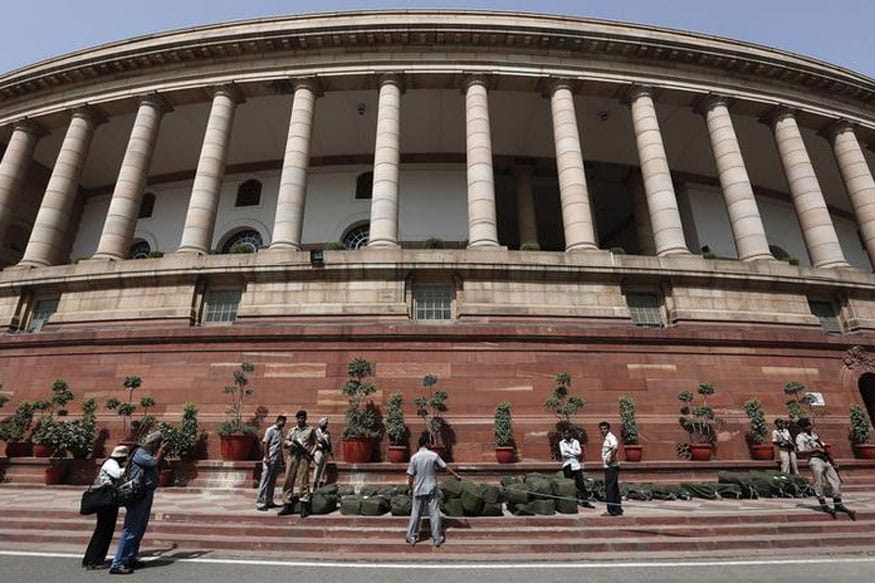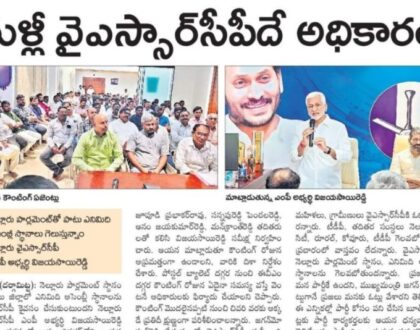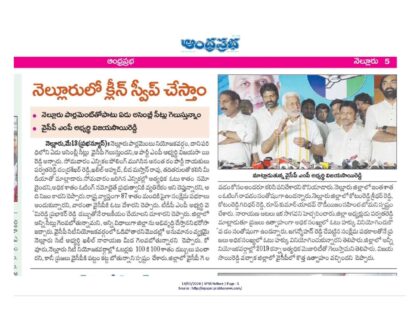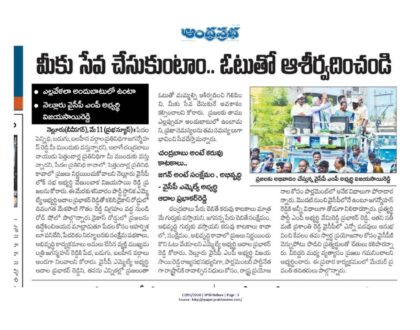OPINION| Anti-Defection Law is a Web That Govt Needs to Untangle Soon

OPINION| Anti-Defection Law is a Web That Govt Needs to Untangle Soon
Allegations of legislators defecting in violation of the law have happened in many states across India, including Andhra Pradesh, Arunachal Pradesh, Goa, Manipur, Nagaland, Telangana and Uttarakhand.

File photo of Parliament. (Reuters)
An issue hangs like the proverbial sword of Damocles on the moral fabric of the nation’s political system. India’s controversial anti-defection law, which is often invoked just before a trial of strength to manipulate numbers in a House, needs to be quickly debated and dusted. Currently, the provisions of the law are prone to serious abuse and manipulation.
Let us cite some examples here to prove why the government needs to take a serious look at the law.
On September 18, 2017, 18 dissident AIADMK MLAs belonging to the TTV Dinakaran faction were disqualified by Tamil Nadu Speaker P Dhanapal after they withdrew support to Chief Minister E Palaniswami, bringing the effective strength of the House from 234 to 215. It is a different matter that Palaniswami needs only 108 MLAs to survive.
Consider the case in 2015 when the Hyderabad High Court refused to intervene after hearing a petition that alleged the delay by the Telangana Assembly Speaker in acting against a member under the anti-defection law.
Now, there have been several cases where the courts have expressed concern about the unnecessary delay in deciding such petitions. This delay in decision making has often helped members, who have defected from their parties, to remain members of the House. In some cases, opposition members have been appointed ministers while still retaining membership of their original parties. This needs to change.
As an MP from Andhra Pradesh, I think it would be pertinent on my part to highlight how in recent years, opposition legislators in Andhra Pradesh and Telangana have broken away in small groups to join the ruling party. In some of these cases, more than two-third of opposition defected to the ruling party.
On paper, the legislators should be disqualified. But will it happen? What has happened in reality? The Telangana Speaker in March 2016 allowed the merger of the TDP in Telangana with the ruling TRS, citing that in total, 80 percent of the TDP MLAs (12 out of 15) had joined the TRS at the time of taking the decision.
Legislators of the main opposition party in Andhra Pradesh, YSR Congress, have been boycotting subsequent Assembly sessions to protest against the delay of nearly two years in action being taken against legislators of their party who have allegedly defected to the ruling TDP.
Now, see the politics behind this drama. CM Chandrababu Naidu once cried foul over his legislators being poached in Telangana but he realised it was a model worth plagiarising and nefariously got 20 YSR Congress MLAs to move over to his side; some of whom have even been made ministers.
Allegations of legislators defecting in violation of the law have happened in many states across India, including Andhra Pradesh, Arunachal Pradesh, Goa, Manipur, Nagaland, Telangana and Uttarakhand.
What is distressing is that nothing appears to have changed in India where such defections have only led to grave constitutional crises in the states and prompted judicial interventions that only offered partial solutions.
At the heart of the crisis is the 52nd Amendment to the Constitution that was introduced by the Rajiv Gandhi government which—genuinely—felt defections by lawmakers was a matter of serious concern and that the “evil of political defections” need to be addressed seriously. As a result, the Tenth Schedule was added to the Constitution to specify two circumstances when a member could be disqualified: First, if the member voluntarily gives up membership of a party and second, when the member votes (or abstains from voting) contrary to the directive issued by the party. The guidelines were very, very clear.
Originally, the Tenth Schedule recognised a “split” in a legislature party if at least one-third members ganged up to form a new group or joined another party to bolster their numbers. But, after the 91st Amendment of January 2004, the law now recognises a “merger” that requires at least two-third members of a party to join another party or form a new party without falling prey to the anti-defection law. As a result, too many loopholes ensured that the law could easily be manipulated and distorted by members. Sadly, the misuse continues till date.
In this very context, it will be important to take a look at the 1994 Supreme Court ruling in the Ravi Naik versus Union of India case. It made things worse for members who want to criticise their own party’s policies while retaining membership of the House.
“Even in the absence of a formal resignation from membership, an inference can be drawn from the conduct of a member that he has voluntarily given up his membership of the political party to which he belongs,” the apex court said in Ravi Naik’s case.
If this was not enough, I think it would pertinent to discuss the case of Janata Dal(U) Rajya Sabha MPs Sharad Yadav and Ali Anwar who have both fallen foul of Tenth Schedule due to this interpretation of the law.
Rajya Sabha Chairman M Venkaiah Naidu on September 12, 2017, issued notices to Yadav and Anwar and asked them why they should not be disqualified from the House after the Nitish faction complained that they “voluntarily” quit the JD(U) by participating in the rival RJD’s rally held on August 27, 2017.
But what happens to legislators expelled from their parties first? The members can still retain their membership of the Upper House; they would have be happy to cite the Supreme Court’s 1996 ruling in G Viswanathan vs. Hon’ble Speaker, Tamil Nadu State Assembly that said an expelled lawmaker is morally and legally bound by the party’s whip even after expulsion.
Failure to obey the whip would result in the member’s disqualification from the House. The Supreme Court ruled: “Paragraph 2(1) read with the explanation clearly points out that an elected member shall continue to belong to that political party by which he was set up as a candidate for election as such member. This is so notwithstanding that he was thrown out or expelled from that party.”
Again, it was the Supreme Court who in November 2010 protected Samajwadi Party leaders Amar Singh and Jaya Prada from disqualification despite disobeying the SJP whip who expelled them from the party. It is sad that the issue has been referred to a larger bench which has not been constituted yet.
Now, since the role of the Speaker is very important, he or she must be an impartial arbiter. But in India, the conduct of speakers has often caused much distress. Consider this one. Under the current rules, a lawmaker elected as Speaker (or Chairman) is allowed to resign from the party, and rejoin it if the person demits office. But Speakers in India have often, invariably allowed themselves to be used for gain of their party or leader.
Now, the Tenth Schedule says the Speaker’s (or the Chairperson’s) decision on disqualification issues on ground of defection must be final and cannot be even questioned in a court of law. But then, in the 1991 case of Kihoto Hollohan vs Zachillhu and Others, a constitution bench of the Supreme Court declared the Speaker’s decision was subject to judicial review.
So it must be safely presumed that the Tenth Schedule is actually to check the Aaya Ram Gaya Ram culture — a phrase that became popular after Haryana legislator Gaya Lal changed his party thrice on a single day in 1967 — and not exactly about the principles of the law.
The Schedule runs counter to Articles 105 and 194 which guarantee free speech to MPs and legislators. However, the SC decided to uphold it, saying: “The anti-defection law seeks to recognise the practical need to place the proprieties of political and personal conduct… above certain theoretical assumptions.”
It needs to be remembered that all anti-defection laws come in the way of a lawmaker expressing some independent views without fear of losing the seat. So what should the lawmaker do? Should the anti-defection law be used only during confidence motions?
Two committees, the 1990 Dinesh Goswami Committee on Electoral Reforms and the Law Commission in its 170th Report in 1999 were unanimous in saying parties should issue whips only when the government is in danger. The Dinesh Goswami Committee and the Constitution Review Commission headed by Justice MN Venkatachaliah (formed in 2002) had recommended such a decision be made by the President or the Governor on the Election Commission’s advice, as in the case of disqualification on grounds of office of profit. Hence, it is abundantly clear that a neat legal solution to defections is woefully missing.
So how does one handle the crisis?
The Vice President, in his order last year disqualifying two JD(U) members stated that all such petitions should be decided by the Presiding Officers within a period of around three months. But has that happened? The answer is a Big No.
(The author is a Rajya Sabha MP of YSR Congress Party. Views are personal)
Allegations of legislators defecting in violation of the law have happened in many states across India, including Andhra Pradesh, Arunachal Pradesh, Goa, Manipur, Nagaland, Telangana and Uttarakhand.

File photo of Parliament. (Reuters)
An issue hangs like the proverbial sword of Damocles on the moral fabric of the nation’s political system. India’s controversial anti-defection law, which is often invoked just before a trial of strength to manipulate numbers in a House, needs to be quickly debated and dusted. Currently, the provisions of the law are prone to serious abuse and manipulation.
Let us cite some examples here to prove why the government needs to take a serious look at the law.
On September 18, 2017, 18 dissident AIADMK MLAs belonging to the TTV Dinakaran faction were disqualified by Tamil Nadu Speaker P Dhanapal after they withdrew support to Chief Minister E Palaniswami, bringing the effective strength of the House from 234 to 215. It is a different matter that Palaniswami needs only 108 MLAs to survive.
Consider the case in 2015 when the Hyderabad High Court refused to intervene after hearing a petition that alleged the delay by the Telangana Assembly Speaker in acting against a member under the anti-defection law.
Now, there have been several cases where the courts have expressed concern about the unnecessary delay in deciding such petitions. This delay in decision making has often helped members, who have defected from their parties, to remain members of the House. In some cases, opposition members have been appointed ministers while still retaining membership of their original parties. This needs to change.
As an MP from Andhra Pradesh, I think it would be pertinent on my part to highlight how in recent years, opposition legislators in Andhra Pradesh and Telangana have broken away in small groups to join the ruling party. In some of these cases, more than two-third of opposition defected to the ruling party.
On paper, the legislators should be disqualified. But will it happen? What has happened in reality? The Telangana Speaker in March 2016 allowed the merger of the TDP in Telangana with the ruling TRS, citing that in total, 80 percent of the TDP MLAs (12 out of 15) had joined the TRS at the time of taking the decision.
Legislators of the main opposition party in Andhra Pradesh, YSR Congress, have been boycotting subsequent Assembly sessions to protest against the delay of nearly two years in action being taken against legislators of their party who have allegedly defected to the ruling TDP.
Now, see the politics behind this drama. CM Chandrababu Naidu once cried foul over his legislators being poached in Telangana but he realised it was a model worth plagiarising and nefariously got 20 YSR Congress MLAs to move over to his side; some of whom have even been made ministers.
Allegations of legislators defecting in violation of the law have happened in many states across India, including Andhra Pradesh, Arunachal Pradesh, Goa, Manipur, Nagaland, Telangana and Uttarakhand.
What is distressing is that nothing appears to have changed in India where such defections have only led to grave constitutional crises in the states and prompted judicial interventions that only offered partial solutions.
At the heart of the crisis is the 52nd Amendment to the Constitution that was introduced by the Rajiv Gandhi government which—genuinely—felt defections by lawmakers was a matter of serious concern and that the “evil of political defections” need to be addressed seriously. As a result, the Tenth Schedule was added to the Constitution to specify two circumstances when a member could be disqualified: First, if the member voluntarily gives up membership of a party and second, when the member votes (or abstains from voting) contrary to the directive issued by the party. The guidelines were very, very clear.
Originally, the Tenth Schedule recognised a “split” in a legislature party if at least one-third members ganged up to form a new group or joined another party to bolster their numbers. But, after the 91st Amendment of January 2004, the law now recognises a “merger” that requires at least two-third members of a party to join another party or form a new party without falling prey to the anti-defection law. As a result, too many loopholes ensured that the law could easily be manipulated and distorted by members. Sadly, the misuse continues till date.
In this very context, it will be important to take a look at the 1994 Supreme Court ruling in the Ravi Naik versus Union of India case. It made things worse for members who want to criticise their own party’s policies while retaining membership of the House.
“Even in the absence of a formal resignation from membership, an inference can be drawn from the conduct of a member that he has voluntarily given up his membership of the political party to which he belongs,” the apex court said in Ravi Naik’s case.
If this was not enough, I think it would pertinent to discuss the case of Janata Dal(U) Rajya Sabha MPs Sharad Yadav and Ali Anwar who have both fallen foul of Tenth Schedule due to this interpretation of the law.
Rajya Sabha Chairman M Venkaiah Naidu on September 12, 2017, issued notices to Yadav and Anwar and asked them why they should not be disqualified from the House after the Nitish faction complained that they “voluntarily” quit the JD(U) by participating in the rival RJD’s rally held on August 27, 2017.
But what happens to legislators expelled from their parties first? The members can still retain their membership of the Upper House; they would have be happy to cite the Supreme Court’s 1996 ruling in G Viswanathan vs. Hon’ble Speaker, Tamil Nadu State Assembly that said an expelled lawmaker is morally and legally bound by the party’s whip even after expulsion.
Failure to obey the whip would result in the member’s disqualification from the House. The Supreme Court ruled: “Paragraph 2(1) read with the explanation clearly points out that an elected member shall continue to belong to that political party by which he was set up as a candidate for election as such member. This is so notwithstanding that he was thrown out or expelled from that party.”
Again, it was the Supreme Court who in November 2010 protected Samajwadi Party leaders Amar Singh and Jaya Prada from disqualification despite disobeying the SJP whip who expelled them from the party. It is sad that the issue has been referred to a larger bench which has not been constituted yet.
Now, since the role of the Speaker is very important, he or she must be an impartial arbiter. But in India, the conduct of speakers has often caused much distress. Consider this one. Under the current rules, a lawmaker elected as Speaker (or Chairman) is allowed to resign from the party, and rejoin it if the person demits office. But Speakers in India have often, invariably allowed themselves to be used for gain of their party or leader.
Now, the Tenth Schedule says the Speaker’s (or the Chairperson’s) decision on disqualification issues on ground of defection must be final and cannot be even questioned in a court of law. But then, in the 1991 case of Kihoto Hollohan vs Zachillhu and Others, a constitution bench of the Supreme Court declared the Speaker’s decision was subject to judicial review.
So it must be safely presumed that the Tenth Schedule is actually to check the Aaya Ram Gaya Ram culture — a phrase that became popular after Haryana legislator Gaya Lal changed his party thrice on a single day in 1967 — and not exactly about the principles of the law.
The Schedule runs counter to Articles 105 and 194 which guarantee free speech to MPs and legislators. However, the SC decided to uphold it, saying: “The anti-defection law seeks to recognise the practical need to place the proprieties of political and personal conduct… above certain theoretical assumptions.”
It needs to be remembered that all anti-defection laws come in the way of a lawmaker expressing some independent views without fear of losing the seat. So what should the lawmaker do? Should the anti-defection law be used only during confidence motions?
Two committees, the 1990 Dinesh Goswami Committee on Electoral Reforms and the Law Commission in its 170th Report in 1999 were unanimous in saying parties should issue whips only when the government is in danger. The Dinesh Goswami Committee and the Constitution Review Commission headed by Justice MN Venkatachaliah (formed in 2002) had recommended such a decision be made by the President or the Governor on the Election Commission’s advice, as in the case of disqualification on grounds of office of profit. Hence, it is abundantly clear that a neat legal solution to defections is woefully missing.
So how does one handle the crisis?
The Vice President, in his order last year disqualifying two JD(U) members stated that all such petitions should be decided by the Presiding Officers within a period of around three months. But has that happened? The answer is a Big No.
(The author is a Rajya Sabha MP of YSR Congress Party. Views are personal)
Recommended Posts

In media on 3 June 2024
03/06/2024

In media on 14 May 2024
14/05/2024

In media on 12 May 2024
12/05/2024

